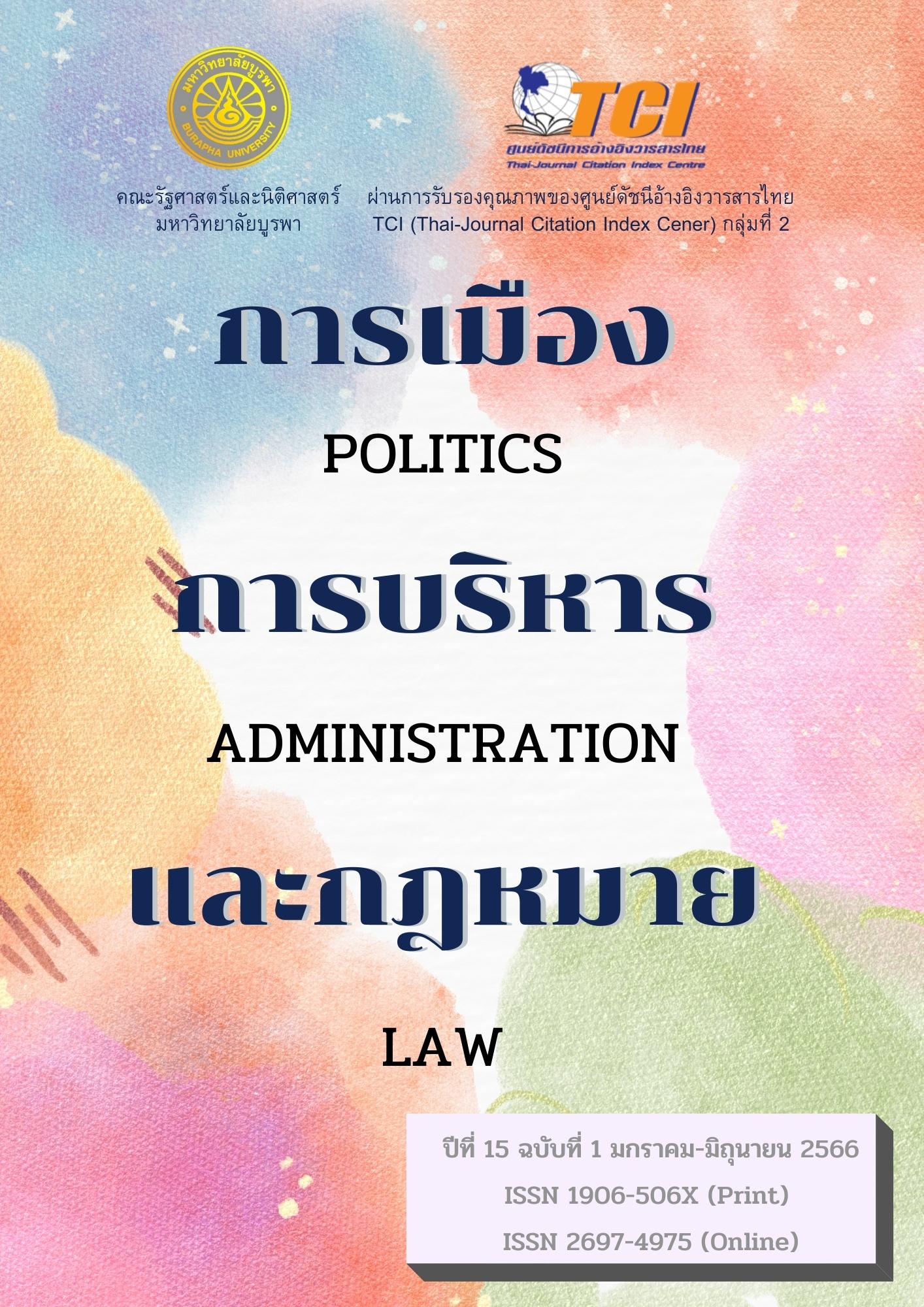ความสัมพันธ์ระหว่างภาวะผู้นำของผู้บริหารกับบรรยากาศองค์การ ของเทศบาลนครในจังหวัดชลบุรี
คำสำคัญ:
ภาวะผู้นำ, บรรยากาศองค์การ, เทศบาลนครบทคัดย่อ
บทความวิจัยฉบับนี้มีวัตถุประสงค์เพื่อ 1)ศึกษาภาวะผู้นำของผู้บริหารของเทศบาลนคร 2)ศึกษาบรรยากาศองค์การของเทศบาลนคร และ 3)ศึกษาความสัมพันธ์ระหว่างภาวะผู้นำกับบรรยากาศองค์การในเทศบาลนคร ในจังหวัดชลบุรี เป็นการวิจัยเชิงปริมาณ ประชากรและกลุ่มตัวอย่างคือบุคลากรที่ปฏิบัติงานอยู่ในเทศบาลนครในจังหวัดชลบุรี 2 แห่ง คือ เทศบาลนครแหลมฉบัง และเทศบาลนครเจ้าพระยาสุรศักดิ์ จำนวน 330 คน เครื่องมือที่ใช้ในการวิจัยเป็นแบบสอบถามมาตรวัด 5 ระดับ การวิเคราะห์ข้อมูลโดยใช้สถิติเชิงพรรณนาด้วยค่าสถิติ จำนวน ร้อยละ ค่าเฉลี่ย และส่วนเบี่ยงเบนมาตรฐาน และทดสอบสมมติฐานด้วยสถิติสหสัมพันธ์แบบเพียร์สัน ผลการวิจัยพบว่า 1)ภาวะผู้นำในภาพรวมอยู่ในระดับมาก และรายด้านอยู่ในระดับมากทั้งหมด โดยด้านการมีอิทธิพลอย่างมีอุดมการณ์ ด้านการสร้างแรงบันดาลใจ ด้านการคำนึงถึงความเป็นปัจเจกบุคคล และด้านการกระตุ้นทางปัญญา เรียงตามลำดับ และ 2)บรรยากาศองค์การในภาพรวมอยู่ในระดับมาก และรายด้านอยู่ในระดับมากทั้งหมด โดยด้านการให้ความอบอุ่นและการสนับสนุน ด้านการมีส่วนร่วมในการตัดสินใจ และด้านการสร้างความไว้วางใจซึ่งกันและกัน เรียงตามลำดับ 3) ความสัมพันธ์ระหว่างภาวะผู้นำกับบรรยากาศองค์การในเทศบาลนคร ในจังหวัดชลบุรี อยู่ในระดับปานกลาง (r = .615) ที่ระดับนัยสำคัญ .01 โดยคู่ที่มีความสัมพันธ์สูงสุดคือ ภาวะผู้นำด้านการคำนึงถึงความเป็นปัจเจกบุคคลกับบรรยากาศองค์การด้านการมีส่วนร่วมในการตัดสินใจ (r = .778) รองลงมาคือ ภาวะผู้นำด้านการคำนึงถึงความเป็นปัจเจกบุคคลกับบรรยากาศองค์การด้านการให้ความอบอุ่น (r = .586) และการสนับสนุน และภาวะผู้นำด้านการกระตุ้นทางปัญญากับบรรยากาศองค์การด้านการมีส่วนร่วมในการตัดสินใจ (r= .560)
เอกสารอ้างอิง
ชไมพร กาญจนกิจสกุล. (2555). ระเบียบวิธีวิจัยทางสังคมศาสตร์. ตาก: บริษัทโพรเจ็คท์ ไฟฟ์-โฟว์ จำกัด.
ภาสกร ภักดิ์ศรีแพง. (2548). ความสัมพันธ์ระหว่างภาวะผู้นำของผู้บริหารกับบรรยากาศองค์การของโรงเรียนคาทอลิก สังกัดสัฆมณฑลจันทบุรี. วิทยานิพนธ์
การศึกษามหาบัณฑิต (การบริหารการศึกษา), บัณฑิตวิทยาลัย, มหาวิทยาลัยบูรพา.
รัตติกรณ์ จงวิศาล. (2545). ภาวะผู้นำการเปลี่ยนแปลงในยุคแห่งการเปลี่ยนแปลง. วารสารการบริหารคน, 23(2), 98-102.
วรรณี แกมเกตุ. (2551). วิธีวิทยาการวิจัยทางพฤติกรรมศาสตร์ (พิมพ์ครั้งที่ 2). กรุงเทพฯ: โรงพิมพ์แห่งจุฬาลงกรณ์มหาวิทยาลัย.
ศุภมาศ นุ้ยเล็ก. (2547). การศึกษาความสัมพันธ์ระหว่างภาวะผู้นำกับบรรยากาศองค์การ ของสำนักงานสรรพากรพื้นที่นนทบุรี. วิทยานิพนธ์บริหารธุรกิจมหาบัณฑิต (การ
จัดการทั่วไป), มหาวิทยาลัยราชภัฏพระนคร.
สร้อยตระกูล (ติวานนท์) อรรถมานะ. (2541). พฤติกรรมองค์การ: ทฤษฎีและการประยุกต์. กรุงเทพฯ: สำนักพิมพ์มหาวิทยาลัยธรรมศาสตร์.
สุมาลัย หงษา. (2556). ความสัมพันธ์ระหว่างภาวะผู้นำของผู้บริหารกับบรรยากาศองค์การของโรงเรียนอนุบาลเมืองใหม่ชลบุรี สังกัดองค์การบริหารส่วนจังหวัดชลบุรี. งานนิพนธ์
การศึกษามหาบัณฑิต (การบริหารการศึกษา), คณะศึกษาศาสตร์ มหาวิทยาลัยบูรพา.
เสริมศักดิ์ วิศาลาภรณ์. (2552). ภาวะผู้นำ. ประมวลสาระชุดวิชาทฤษฎีและแนวปฏิบัติในการบริหารการศึกษา หน่วยที่ 5-8 (พิมพ์ครั้งที่ 9). นนทบุรี: มหาวิทยลัยสุโขทัย
ธรรมาธิราช.
Gibson, J. L., Ivancevich, J. M., & Donnelly, J. H. (2000). Organization: Behavior Structure Process (10th ed). Boston: McGraw-Hill.
Hinkle, D. E. (1998). Applied Statistics for the Behavioral Science. Boston: Houghton Mifflin.
Litwin, G., & Stringer, R. (1968). Motivation and Organizational Climate. Massachusetts: Harvard University Press.
Stringer, R. A. (2002). Leadership and organizational climate. Upper Saddle River: Prentice Hall.
Yamane, T. (1967). Statics: An Introductory Analysis. New York: Harper and Row.
ดาวน์โหลด
เผยแพร่แล้ว
ฉบับ
ประเภทบทความ
สัญญาอนุญาต

อนุญาตภายใต้เงื่อนไข Creative Commons Attribution-NonCommercial-NoDerivatives 4.0 International License.






